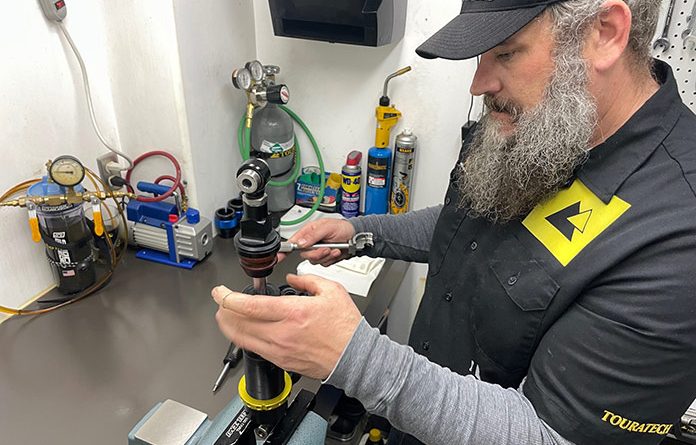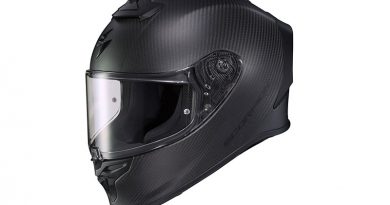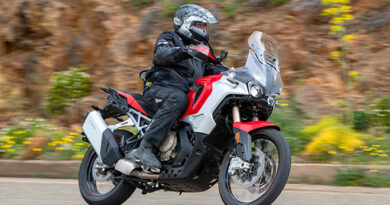Touratech Suspension Service | Gear Review
Rider’s former editor-in-chief, Mark Tuttle, gives us the lowdown on Touratech suspension service for the Touratech Extreme replacement rear shock for his BMW R 1200 GS.
One of the reasons I bought a lightly used 2007 BMW R 1200 GS was for its generous load capacity of 441 lb – a weight limit that’s pretty easy to hit when you’re two-up touring, even before breakfast.
Although my wife and I were careful not to exceed that limit on our first long ride, it turned out that the bike’s stock rear shock simply wasn’t up to the task of carrying the loaded hard luggage, two of us in full riding gear, and 5 gallons of gas. Even with the spring preload maxed out, the back end sagged like an overloaded pickup truck, drastically slowing the GS’s normally responsive steering. The shock also bottomed out way too easily over big bumps.
As soon as we got home, I gave the folks at Touratech USA a call. Back then as now, Touratech offers high-end Extreme front and rear shocks developed in Germany and built in the Netherlands by TracTive for 2007-2013 BMW oil-cooled R 1200 GS models. Although there’s more emphasis on the company’s replacement shocks with electronic suspension adjustment (ESA) these days, Touratech still sells and services TracTive Extreme components for many ADV bikes. These components are popular among riders who like to “geek out” on manually set suspension settings and get more in touch with their bike.
Once I mounted up the Extreme shocks on my Beemer, I couldn’t have been more pleased. I wrote a full Touratech motorcycle suspension review for Rider in 2013, including a complete rundown of the shocks’ specs and features.
Suffice it to say that the rear Extreme shock solved all my load carrying and handling problems and gave the bike a much better ride to boot. For that 2013 review, however, I wasn’t aware that Touratech specifies “regular” service intervals for its Extreme shocks. That makes sense; unlike the stock shock, as usual a poor compromise between performance and longevity, better performance means using parts that may wear. For comparison, rock-hard stock tires (a.k.a. rim protectors) versus premium replacement rubber with good grip but less longevity come to mind.
Touratech says that whether it’s time for shock service at 10,000 miles or 30,000 miles really depends upon how hard the shock is used and how concerned the owner may be about preventing problems on a long remote ride. Over time, shock oil breaks down and gets contaminated, seals wear, and nitrogen pressure decreases, all leading to reduced performance and longevity issues, and you don’t want to damage something like the shock shaft, for example, by waiting too long. If you’re the type who’d rather not make the call, Touratech recommends two years or 20,000 miles on its Suspension Service Center website.
In my case, the first interval turned out to be almost exactly 10,000 miles when I noticed that the lower shock seal was weeping oil – the first stage in the “weeping, seeping, leaking” progression from bad to worse. An hour later, I had the shock boxed up and ready to ship to Touratech in Seattle. Once service is complete, return shipping is included in the $150 fee ($200 for ESA shocks). In my case, it was Touratech’s slower season, so the turnaround time was only about two weeks, but it can take up to five at busier times.
For this conventional shock service, Nick at Touratech disassembled, cleaned, and inspected the shock body and shaft, preload adjuster, damping piston, and shims. Replacing the damping piston ring is included. If any other worn or damaged parts need replacing (like the bump stop and seal head on my shock), Touratech only charges the cost of the parts – all labor is included. The remote reservoir did not need servicing, but oddly, the retainer ring for the lower clevis had come partially adrift, so Nick replaced the lower clevis, retainer ring, and circlip for good measure. The gang at Touratech had never seen this happen before; must have been that big jump…
Once the shock was reassembled with fresh oil and nitrogen, Nick carefully boxed it up and shipped it back, and I was riding the BMW again within three weeks. Although I hadn’t noticed any degradation in performance before it was serviced, the rear suspension felt firm, supple, and controlled, as good as the first day I installed the Extreme shock back in 2013.
Touratech also changes shock springs and services its electronic shocks and fork cartridges, all at a reasonable cost with free return shipping – all good reasons to consider putting its suspension products on your ADV bike in the first place.
For more information, visit the Touratech website.
The post Touratech Suspension Service | Gear Review appeared first on Rider Magazine.




